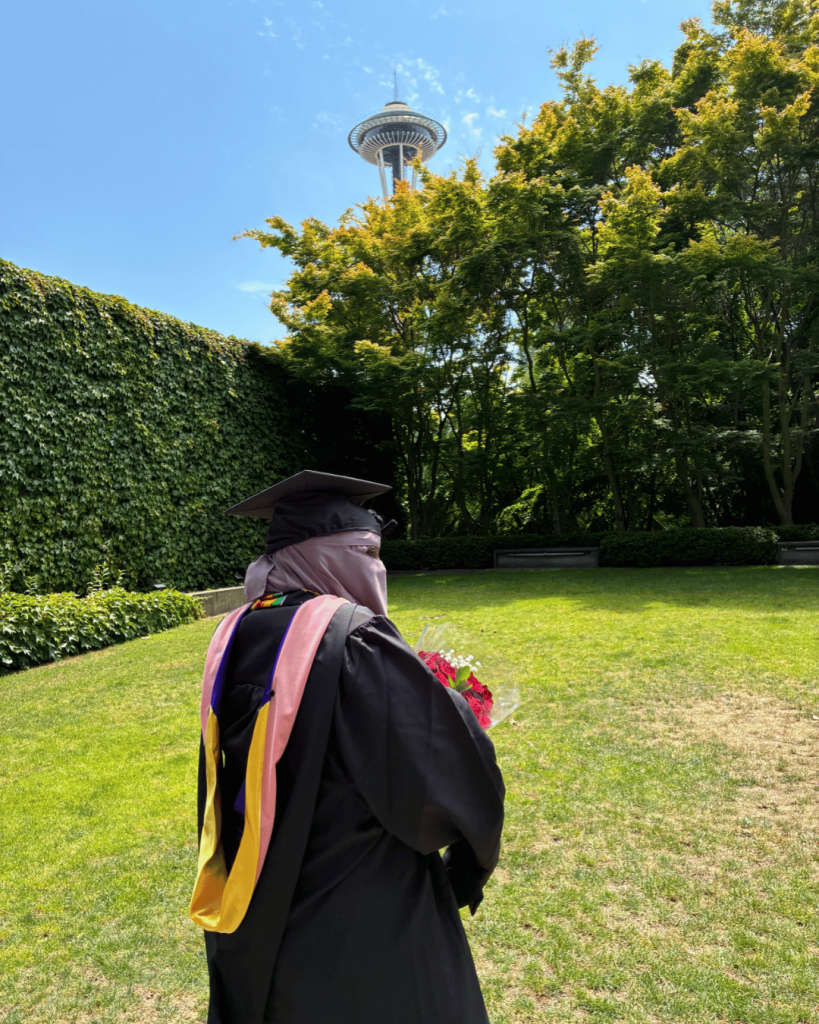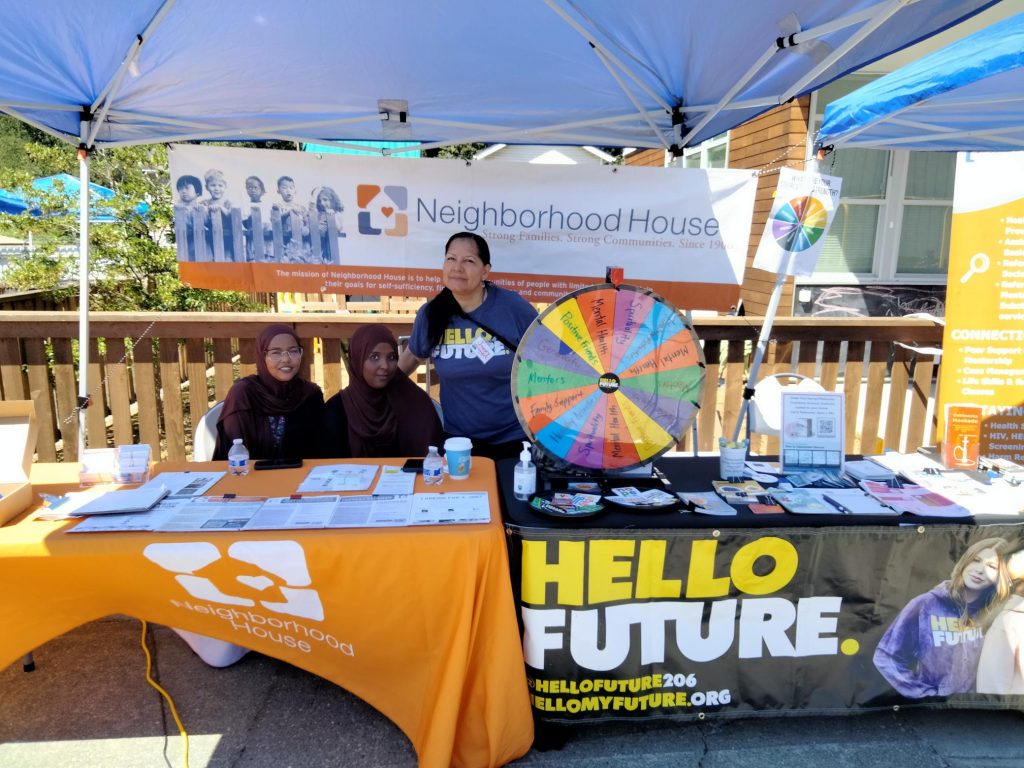August 19, 2025
Samira Farah leads with faith and community in public health research

Samira Farah’s, MPH ‘25, thesis project shows how cultural expertise is a strength in public health research.
While working on her MPH, Samira Farah was searching for opportunities to create culturally adapted mental health programs for her Somali community. “A family member of mine has a mental illness, and watching my family go through managing this really opened my eyes to how mental health doesn’t just affect one person; it affects entire families and communities,” said Farah.
Finding a place in public health
Before starting her MPH, Farah volunteered with the Somali Health Board as part of their mental health team. “My personal and volunteer experience showed a huge gap in what Western medicine offers us and what makes sense in our community,” said Farah. “I wanted to work to bridge that gap and find ways to make mental health work for immigrant communities. Specifically, by honoring how they understand wellness and involving families in the process.”
Farah spoke to her faculty advisor about her research interests and was connected with Lesley Steinman, Research Scientist at the Health Promotion Research Center. Steinman and Co-Principal Investigator Najma Mohamed, of Neighborhood House, were working with social service providers and community members to improve mental health care access for Somali communities. The project, funded by UW’s Population Health Initiative and Alacrity Center, aimed to culturally adapt the World Health Organization’s mental health program, Problem Management Plus (PM+), by incorporating Somali and Islamic values into the program. “It was exactly what I wanted to do and everything I was enthusiastic about,” said Farah. “I chose to work on the project as my practicum and then continued to work on it for my thesis. I felt like I found my calling by using my education to directly help my community.”
Leading with culture and faith

While Steinman and the research team focused on data analysis and metrics, and Mohamed and her team facilitated community relationships and spaces, Farah shared her cultural and religious expertise. With the guidance of mental health counselor and Imam Abdullahi Jaranow at the OBK Islamic Center, Farah helped lead the team in making changes that would resonate and align with the community. For instance, Farah incorporated Duas (prayers) into the program’s breathing exercises and arranged the activities to coincide with Salah (ritual prayer times).
Another adaptation included shifting examples to reflect the community and adding prophet stories as examples of resilience and problem-solving. “Our culture is big on oral storytelling, so incorporating the prophet stories brought together this idea that logic and faith can be used together to solve problems,” said Mohamed. “Community members, from elders to youth, really resonated with the stories and saw themselves in the examples.”
The incorporation of cultural and religious elements and framing the program through a religious lens helped address community stigma surrounding mental health. “The religious lens made it easier for the community to accept and participate in the program. It made it easier for the community to recognize that Somali culture views mental health in a spiritual way,” said Farah.
The success of both the team’s approach and the cultural and religious program adaptations was reflected in the data and in the community’s acceptance of the program. In fact, community members liked the program so much, they started sharing the skills they learned from the program with their own families and friends. “That sharing shows that we’ve created something that belongs to the community rather than something that’s imposed on them,” said Farah.
Building on their foundation
To continue their work, HPRC and Neighborhood House have received Tier 2 funding from PHI to evaluate the adapted PM+ program. “Our North Star moving forward is to keep working authentically with the community,” said Steinman. “We’re applying for another grant with Neighborhood House to expand community-led, co-design with other immigrant and refugee communities to adapt mental health programs that center the values and resources of community members and social service providers.”
Farah will continue working with the team on the project and with OBK Islamic Center. Post graduation she’s looking into implementation science and intervention development opportunities. “This project was just the start. I want to keep doing community-based work where we use culture to get better results,” said Farah.
To other students who hope to do research with their communities, Farah offers the following advice: 1) find mentors who believe in community-based approaches, 2) be patient with the process as meaningful work takes time, and 3) bring your whole self to work. “If you’re coming from a community that’s underserved, lean into that. Your lived experience is data, and your cultural knowledge is expertise. Don’t let anyone tell you that you have to choose between being academically rigorous and being culturally authentic,” said Farah. “When you do research with your community instead of on them, everyone wins.”
Special thanks
Neighborhood House and the Health Promotion Research Center extend heartfelt thanks to the community partners who helped make this project possible.
- The Co-Design Council—including Neighborhood House, Public Health Seattle-King County, Somali Family Safety Task Force, Somali Health Board, Seattle Housing Authority, independent consultants and community members— for their invaluable input on program adaptations.
- The Omar Bin Al-Khattab Islamic Center for their guidance on PM+ Islamic adaptations and support in participant recruitment.
- The Northwest Center for Public Health Practice for funding Samira through their public health stipend program which supports students partnering with community-based organizations.
- UW Alacrity Center for funding that encouraged human-centered design methods which focused on community strengths and resources, and team members Tricia Aung, Brittany Blanchard, Doyanne Darnell, John Fortney, Aaron Lyon, Sean Muson, Katie Osterhage, and Mike Pullman for their efforts to align research metrics with community needs.
- UW Population Health Initiative for funding to promote collaborations with community-based organizations of historically underserved communities, and PHI staff Arti Shah and PHI Social Entrepreneurship Fellow Xinxin Feng for their guidance and support to explore sustainability pathways for mental health programming post-grant funding.
- Team Members Ruman Beynah, KeliAnne Hara-Hubbard, Emy Haruo, Farhiya Osman & Julie Romero their expertise and dedication made this project possible.